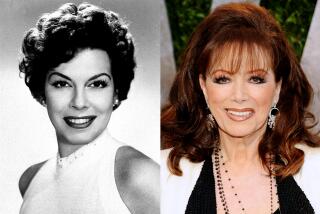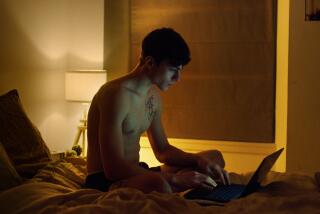The Sunday Conversation: Romola Garai in a thriving period
British actress Romola Garai, who grabbed the attention of American audiences with star turns in 2007’s “Atonement” and the 2009 Austen miniseries “Emma,” returns on Sept. 10 in Encore’s presentation of “The Crimson Petal and the White,” adapted from Michel Faber’s 2002 novel of Victorian London. The Golden Globe nominee costars with Chris O’Dowd and Gillian Anderson as a prostitute who attempts to raise her station in life through a relationship with a wealthy man.
When you starred in “I Capture the Castle,” you worried that you wouldn’t do the book justice since it had so many fans. Did you feel similar pressure about “The Crimson Petal and the White”?
Very much, very, very much. It’s a book with mad passionate fans, and not just people who are interested in Victoriana, because it’s such an amazingly researched book. And also Michel, who spent 20 years of his life writing this novel, which is the most extraordinary thing, and you’re trying to bring that character to life, and it’s a huge responsibility. It was pretty daunting.
PHOTOS: Celebrity portraits by The Times
Were you a fan of the novel before you got involved with the miniseries?
Yes, I was very much a fan of the novel and a fan of the writer, Michel, all of his work, but particularly this book. It’s certainly his biggest novel, and I think it’s the kind of book you can’t really compare to other pieces of work.
It exists completely in its own literary box and in its own landscape. It’s obviously a piece of really intensely detailed research about the London underworld of the 1860s, but it’s also a really, really passionate book about writing and being creative and about a woman being creative as well. It’s also a really hopeful book about the emancipating experience of motherhood, which is not really something you hear very often. And I think it has, like really great novels like “Middlemarch” and Dickens, it has huge humanity for all of its characters.
PHOTOS: Hollywood back lot moments
Speaking of emancipation, your character, Sugar, is a shrewd prostitute who tries to better herself. Prostitution is presented almost as a political choice. Another character says she’d rather do that than be exploited as a factory worker. Do you think that’s a modern view of it?
I don’t know whether I think it’s a modern view of it. I think it’s a perennial view, but it’s expressed by one of the characters that the economic empowerment they have as prostitutes offers a greater reward than the obvious down sides of the job itself. If the book has a theme, I suppose the theme is exploitation. The female characters are different representations of that. Agnes, the wife, played by Amanda Hale, represents a completely different form of exploitation at the hands of the family unit, and obviously the characters who work in William’s factory are people who are being exploited as an underpaid workforce.
Do you consider her a victim or a victor?
I think she’s both. That’s why it’s a brilliant novel. And that was something that was very important to all of us in making the adaptation — that all the female characters are definitely victims of a system that’s stacked against them, but they scramble for power in their own right. And Sugar’s way of escaping from that struggle is to refuse to force Sophie, [William’s] child who eventually becomes her daughter, to replicate the misery of her own upbringing and the unhappiness of her mother’s life. And that’s how she breaks that cycle.
Your costar, O’Dowd, told TV critics that “These characters are so selfish and actors aren’t the most selfless persons in the world, so combine those two things and it had its ups and downs.” Do you know what ups and downs he was talking about?
Yeah, it was creatively quite a fraught process. There was definitely a lot of disagreement in it about the way that it should be played and the way it should be represented on screen. But I’m one of those people who thinks you tend to only fight about the things that are worth fighting about, and I don’t think that necessarily in the job that I do, having disagreement is necessarily bad. Because quite often it can mean that people are very invested in what they’re doing and they care very much about the outcome. And I think with a story where the characters are being represented ambiguously — both Sugar and William are represented as being selfish and cruel and also they have humanity and love in them as well — it’s hard for actors to always accept the bad elements of their character. You don’t always want to show those.
You’ve been in a lot of period films and television, including “Atonement” and “Emma.” Is that because you’re convincing as a pre-modern woman or is that the customary career path for a British actress?
I think it’s a lot to do with the industry that we have in this country. If you’re a woman and you’re white in the U.K., you will probably do quite a lot of period drama. It’s a product of the industry that we have, and that’s by no means a complaint. I have played many amazing characters, and actually, if you’re going to be in a genre, then I am very happy to be in a genre that allows me to play great 19th century literary heroines.
Do you want to do more contemporary roles?
I suppose so, yeah. But without sounding too pretentious, I try not to want too much out of my career, because I think we don’t have a lot of power as actors over what we do and don’t get work-wise and we have to pay the bills, so I already have the kind of job satisfaction that most people don’t get.
You had a brush with Hollywood in 2004 with “Dirty Dancing: Havana Nights.” Did Hollywood come calling again after “Atonement”?
It was quite a bit before “Atonement.” I’d done “I Capture the Castle,” so I’d done one proper part in a very small British film and I was pretty young. The film was released in 2004, but it must have been made in 2002. I was about 19. I was very young and it was a big opportunity for me to do something with a bigger profile and I obviously loved the original film, but it was an odd experience because when I signed up to do the film, it wasn’t a sequel to “Dirty Dancing.” It was just an ordinary script, sort of a teen film about the Cuban revolution and an American girl falling in love with a Cuban guy, and then they bought the rights to the title “Dirty Dancing” and attached it to the film, and then had to change the film to accommodate that title.
Was it a good experience for you?
Not hugely, no. You have to be a very strong person, who I think possibly had more experience of the industry or support around them to cope with the machinations of the Hollywood studio system. And I was certainly not old enough or experienced enough or not supported enough to cope with the system at that time in my life.
So that’s not on your to-do list right now.
There are obviously so many American directors that I would love to work for.Kelly Reichardt, the Coen brothers, Paul Thomas Anderson, the great auteurs of American film I would love to work for. It’s difficult because to really make a big impact in the States you make a commitment to living there and to being part of that world. And I think living in Los Angeles, trying to get jobs as an actor, is hard. Some English actors live in L.A. and do the rounds and love it. I never did. I was always lonely. It didn’t suit my nature. I think I’m more of a cold-climate person, an indoorsy type, so it never really happened.
Your next film is science fiction, “Last Days on Mars.” When does that come out?
I think it will probably come out early next year. It’s a science fiction movie being directed by a guy called Ruairi Robinson. He’s an Irish director. And the cast is Liev Schreiber and Elias Koteas and Olivia Williams. It’s a science fiction movie that becomes a zombie movie, but it’s a chamber piece with a very small number of characters and they’re all stuck on a space station together. It’s about a scientific discovery that goes wrong, horribly wrong.
Was it fun?
When I took the job I thought it would be lots of fun, which was one of the reasons I took it, and then I realized we’d be shooting it in Jordan in the Wadi Rum desert, which is about 44 degrees [Celsius, 111.2 degrees Fahrenheit], and we were wearing spacesuits the entire time. Whenever you take something where you think, “This will be fun,” it’s always a portent of doom. Cut to four weeks later, and you’re lying on your back in the desert wearing 50 kilos [110 pounds] of spacesuit, thinking, “How could I have got this so wrong?”
PHOTOS, VIDEO AND MORE:
PHOTOS: ‘Dancing With the Stars: All-Stars’: Meet the cast
London Olympics: The Games, our way
VIDEO: Watch the latest fall TV trailers here
More to Read
The complete guide to home viewing
Get Screen Gab for everything about the TV shows and streaming movies everyone’s talking about.
You may occasionally receive promotional content from the Los Angeles Times.






